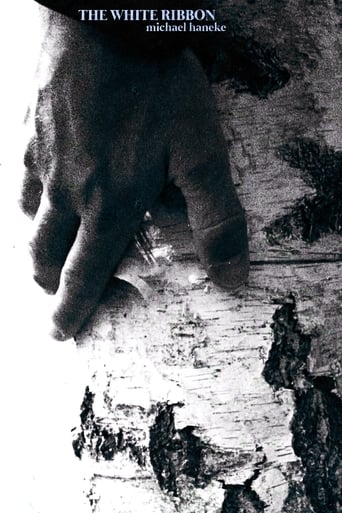shelleyk-87798
Be warned that I write this as a WWII historian who has also (obviously) studied WWI so I can see the stupidity of this 'film' on so many, many levels that it was truly excruciating for me. Let's just say that this oh-so-deep analysis of what led Germany to WWI (and WWII for that matter) is......... wait for it......... Germans are inherently evil (canned applause here). My God. So simple. So stupid.
And might I add that the subtlety that other writers refer to does not exist. The evil of Germans is rammed down your throat with all the "subtlety" of a machete and a foghorn including some of the grossest acts known to humans performed by just your common village-folk.
By presenting racism as an explanation so that we don't have to bother ourselves with anything so complicated as, well, history, it is best to shoot the film in black and white to give it a bit of style, since there really isn't any substance. When the 'moral' lesson is that a ethnic group is just inferior and evil and that's that, you better lean on Style.
Stop. Please.
Captain Sorearm
One of the great pleasures of watching a film for the first time is the bubbling of thoughts and ideas going through your mind about where this will all lead and of what meaning is being imbued. The White Ribbon is magnificent in that it keeps this constant inner dialogue alive throughout. By not over-explaining events you end up having a beautifully filmed and edited slice of life at it's most interesting. In life it often takes a period of time until you become fully aware of events and people's involvement in them and it's nourishing to know that your own instincts keep working behind the scenes to help understand things for the future. I love the way The White Ribbon doesn't tie up all loose ends, and although I have only seen it once, I have thought about watching it again many times.My only disagreement with other 10/10 reviewers is the knife and fork linkage to Nazis. I think by inferring that the children of the film will be adults by the time of WW2 is clumsy and pointless. Michael Hanneke has on a few occasions held up the mirror that young people are not all harmless, lovable creatures and that innate fear by adults of this proposition is a much scarier vision than anything WW2 can conjure. It seems the English-speaking world are sick with the idea that nothing could ever be as bad as a Nazi. Hanneke knows better and so do I.
dimitriscisse
So, starting my word with , I want to say that ''white ribbon'' is a movie about a small town of decade 1910 . Director wants to show how the relations of people formed by the happenings of strange facts. Michael Hanecke indicates who's responsible for them : the children of the town or the doctor with the midwife? I will explain to you why I believe that both are. The children live in a strict disciplined, religious, society . They seem to manage to get over with it but the conservatism of their parents sample their patience . So when they are starting to feel isolated they react with different ways. Clara cut the neck of the bird , they drop baron's son in the river and someone bites his hand. I must say that the kid's of poor locals farmers react to the rich and comfortable Sigi because they feel that they are inferior of him. The question which creating is can the children do things like these happened in the small village of our story? Hanecke shows the indignation of children but he indicates what children can do ( for example when Clara cut the neck of the bird). The other suspects are doctor and midwife. The school teacher who is the narrator of our story indicates that these two might have a connection with the death 's wife of doctor. Doctor has sexual behavior with her daughter . The teacher said that Clari's eyes have been wounded them by the doctor and the midwife. The question is who put the wire on the doctor's house and he fell from his horse? Was it midwife or the children? Generally this movie like Hanecke's movies doesn't give you free and easy answers but he wants to make you think, to make you imagine things just like the end which is an open end .Clearly answers are not given and I like these kind of movies because they make you search for the answers and think how your life would be in 1914 . Would you have been able to live in an environment like that ? For Baron's wife, I don't think so and I believe that Hanecke gave so much freedom of her . Don't be free thinker Hanecke ,women didn't act like that especially the wives of rich people. The shot in black and white is very good idea because Michael wants to transport you in a cruel society of 1914.Anyway very good movie
Kirpianuscus
a film about the roots of evil. precise. fascinating. using the terror in a special manner. a village. and few crimes. the children's faces. the adults ambiguity. and the tension like a fog. a film who reminds Ingmar Bergman's universe but who propose a different perspective about the angry who change, step by step, the life of a community for remind the truth about it. an useful parable about the evil who grow up in the middle of serenity. and a splendid film in which each scene becomes key for define the every day reality. a parable. not original but useful. because it is picture of fury who seems be part of accidents in ordinary place. and who becomes the rule.



